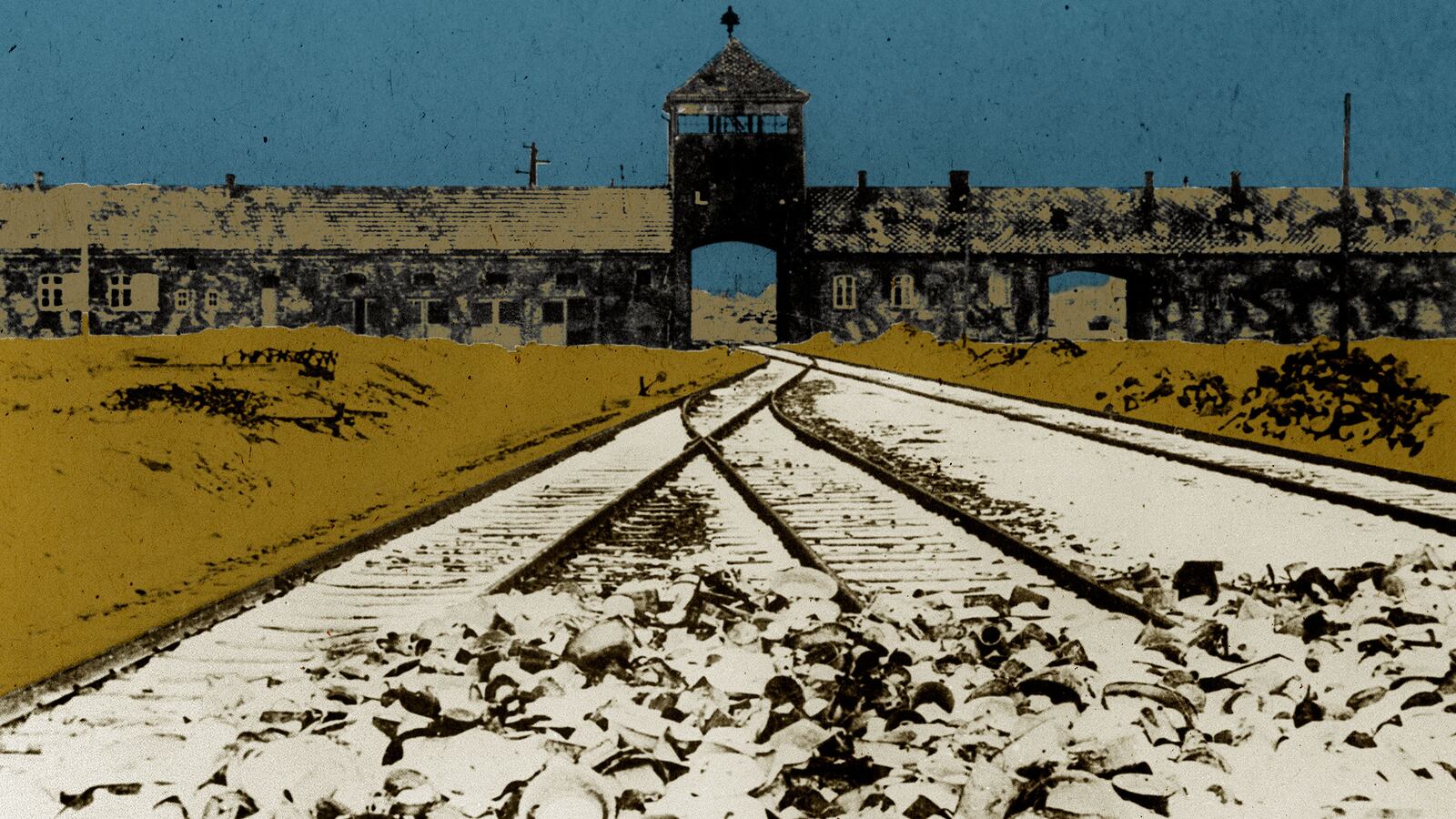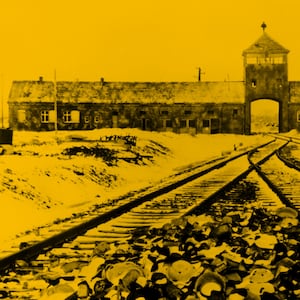It has been 75 years since the Allies decided against bombing Auschwitz and the rail lines leading to it, a decision prompting a debate that still resonates over whether such a raid was practicable and what it could have accomplished. Proponents of bombing contend that it was a feasible operation negated primarily by the indifference of Allied leaders to the plight of the Jews. Critics of such an aerial attack respond that it would have been ineffectual, dangerous for the airmen and fatal to many of the prisoners.
Here is how that decision looked at the time to the Allied, Axis and Jewish leaderships.
On the Allied side, it was the leaders of both the British Bomber Command and the U.S. Air Force who balked at diverting any planes for humanitarian missions. Critics point out that the airlift to the Poles during the 1944 Warsaw uprising had been ordered by Churchill and Roosevelt against the wishes of their commanders. But the Polish government-in-exile was an ally that had marshalled forces who fought valiantly for the Allies in North Africa, Italy and Normandy as well as contributing fighter squadrons to the R.A.F. and its own Home Army actively combating the Germans. The Jews could make no such claim. As it was, the airdrops to the Poles were futile, with many missed targets and 31 planes lost. The Allied forces within closest range of Auschwitz were the Russians. And though there had been talk of shuttling U.S. planes to Soviet bases, Stalin showed no interest in the idea.
There had been efforts by members of the War Refugee Board in Washington and Geneva to prod the U.S. to bomb the camps. John Pehle, executive director of the War Refugee Board, made repeated appeals to John McCloy, the Assistant Secretary of War who wielded significant influence over the use of military resources but dismissed the idea as “impracticable.” McCloy wrote Pehle that the bombing of Auschwitz “could be executed only by a diversion of considerable air support essential to the success of our forces now engaged in decisive operations elsewhere and would in any case be of such doubtful efficacy that it would not warrant the use of our resources.” While brusquely framed, the decision reflected military reality as perceived by a defense establishment with stretched resources trying to meet the diverse demands of an all-encompassing war. The proposal was never raised directly with Roosevelt.
Pehle’s final appeal was made in November. In that month, the gas chambers at Auschwitz were closed.
The Jewish leadership itself was divided over the issue. In London, Chaim Weizmann lobbied the British to bomb the crematoria although he acknowledged that the action might be more symbolic than effective. But in Palestine, the Jewish Agency overwhelmingly opposed the bombing on the grounds that it would likely take Jewish lives while fostering Nazi propaganda. The World Jewish Congress also made an appeal to bomb the camps but even here there was ambivalence. Leon Kubowitzki, the head of the WJC’s Rescue Department, opposed the bombing, fearing that “its first victims would be the Jews.” This was not done out of quiescence. Kubowitzki had earlier advocated a commando raid that would destroy the gas chambers without making Jews collateral damage. American Jewish leaders were equally divided over the issue, which led to recriminations during and after the war.
In fact, something was done, albeit unplanned. On July 2, American planes conducted a heavy raid on Budapest, bombing the marshalling yards and nearby housing. As Randolph Braham writes in The Politics of Genocide, his comprehensive history of the Hungarian liquidation, this came shortly after a message from President Roosevelt to the Hungarian government demanding an immediate end to the transports, warning the Horthy regime that it would be held accountable for the deportations and threatening armed reprisals in case of refusal. Within a week Horthy ended the deportations. Close to 440,000 Jews from the provinces had already been deported, but 250,000, mostly from Budapest, were saved from the Nazis. The deportations never resumed and Eichmann’s efforts to liquidate Hungary’s remaining Jews were foiled. By now, it was clear to Germany’s satellites that the tide had turned against Berlin and they sought to distance themselves from the Nazis and the retribution they would face with an Allied victory. Rumania, which brutally murdered 300,000 of its Jews without benefit of crematoria, desisted only when it became apparent that Germany would lose the war. Military bombing of Hitler’s nervous allies turned out to be far more effective in disrupting the transports and saving lives than raiding Auschwitz or its rail lines.
But being held to account had little effect on the Nazis themselves. First of all, it was widely believed in Germany that the bombing of their cities was already retribution for the Reich’s genocidal measures. Hitler had always maintained that this was a war against the Jews so the demolition of German cities only provided further evidence that the Allied air campaign was undertaken on behalf of the Jews. Although the British bombing campaign killed 400,000 civilians, it failed to break German morale or hinder the war effort. This being the case, why didn’t the Allies simply call the air raids they were already carrying out retribution for the death camps? In fact, Britain maintained throughout the war that its air campaign, however devastating, was never in response to Nazi atrocities. Even when England was threatened by V-1 rockets, Bomber Command kept to its mission and refused to carry out reprisal raids.
Between the end of the Hungarian deportations in July and the closing of the gas chambers in November, 150,000 Jews were murdered at Auschwitz. Given that the Nazis had slaughtered 1 million Jews dispersed over Western Russia over a period of four months in 1941, it’s hard to see how hardened S.S. officers wouldn’t have been able to murder 150,000 Jews over five months in 1944, even without gas chambers.
Implicit in many critiques of the failure to bomb Auschwitz is the assumption that the Jews were vulnerable because they were stateless. But this depends on the nature of the state. Belonging to a powerful Soviet state did not prevent more than 3 million Russian prisoners of war from being killed by the Germans. British and American prisoners were, for the most part, treated correctly; Russians captives were handled differently.
Regarding efforts to save Jewish lives, there were three distinct periods, the prospects growing dimmer at each phase. The first was April 1938 to November 1939, before the outbreak of war, with Jews fleeing the Nazi pogroms of Anschluss in Austria and Kristallnacht in Germany and the subsequent anti-Jewish measures of the Reich. The second was the period between November 1939 and December 1941 when the war had broken out and the Nazis extended their grip on Europe but the U.S was still a neutral nation; and the third was from December 1941 to May 1945 when the U.S. became a combatant against the Axis.
As David Wyman—author of the influential 1978 Commentary essay “Why Auschwitz Was Never Bombed”—wrote in Paper Walls: America and the Refugee Crisis 1938-1941, more could have been done by the U.S. during the early phases in absorbing Jewish refugees when resistance to Jewish immigration was fostered by rampant nativism and widespread anti-Semitism intensified by unemployment that plagued a nation still struggling to emerge from the Depression and abetted by a State Department riddled with patrician anti-Semites.
The stage was already set by the National Origins Act of 1924 mandating quotas that discriminated against immigrants from Southern and Eastern Europe, thereby imposing severe restrictions on Jewish immigration. These were tightened by President Hoover in 1930, as he sought to protect American jobs during the Depression. Subsequent efforts in Congress and the Administration to aid the Jews were thwarted by nativist opposition. Wyman concludes: “One may level the finger of accusation at Franklin Roosevelt for having done so little and Congress for having done nothing. But the accuser will find himself simultaneously pointing at the society which gave American refugee policy its fundamental shape… United States refugee policy from 1938 to the end of 1941 was essentially what the American people wanted.”
Gerhard Weinberg, the historian of Hitler’s Germany, wrote that any examination of the failure to do more on behalf of the Jews should avoid a “dangerous shift in apportioning of responsibility. It is the killers… who bear the central responsibility for their deeds. Any general distribution of blame… only serves to exculpate the truly guilty. And those were not to be found among the Allies.” As Mary Fulbrook reminds us in “Reckonings,” as many as 8,000 Germans worked at Auschwitz-Birkenau and less than a dozen were tried after the war.
Roosevelt reopened the quotas to full use in 1938, reversing Hoover’s 1930 policy, and Weinberg reminds us that the U.S. took in 200,000 of the Jews who fled Europe during this period, or about twice as many “as the rest of the world put together.” But once the U.S. became a belligerent there was very little leverage Washington could exert over Germany. In the historian Henry Feingold’s words, “The Nazis held all the cards.” American entry into the war came in December 1941, hardly more than a month before the Wannsee Conference where the Nazis secretly crafted the blueprint for the Final Solution.
Taking note of this, Feingold reflects that the inaction of the witnessing nations to the Holocaust is “so difficult to reconcile with our own sense of what humanity should be, that the temptation to write a post-hoc brief to indict them before an imaginary bar of justice is almost irresistible. Such briefs contain much truth but their objective is to accuse — a far cry from the historian’s task.”
In this light, the failure to do more on Roosevelt’s part has prompted latter-day accusations of willful indifference tinged by anti-Semitism. It is a strange sort of anti-Semite who, in an era of widespread anti-Semitism, surrounded himself with Jewish advisers, staffed the New Deal — or the Jew Deal, as detractors called it — with Jewish activists, and relied on cabinet members such as Harold Ickes who vigorously supported Jewish interests. There is a reason that the Nazis called him “Rosenvelt.”
More to the point it was FDR who led a reluctant country into WWII, not to save the Jews but to save America and, indeed, Western civilization from global domination by the Axis. It was FDR who, in the face of fierce opposition, prodded Congress in 1940 to pass the Selective Training and Services Act, the first peacetime conscription in U.S. history. At his behest, Congress extended draft duty in 1941 by a single vote, which prepared America to confront the Axis when war came. And it was FDR who fostered Lend-Lease together with the undeclared war in the Atlantic, keeping England in the fight.
This was a far cry from what was being done at the time by a formidable isolationist movement led by Charles Lindbergh, whose ranks were studded with influential press barons, high-ranking military officers and such prominent Republican opponents as Herbert Hoover and Senator Robert Taft of Ohio. As Lynne Olson, writes in Those Angry Days, in May 1940, after Hitler’s Blitzkrieg through France, with England on its heels, Taft opined: “There is a good deal more danger of the infiltration of totalitarian ideas from the New Deal circles in Washington than there ever will be from the activities of the… Nazis.” For Robert McCormick, the powerful publisher of The Chicago Tribune, who bore a special animus for Roosevelt, British imperialism was no different from Nazi aggression. Ever careful not to get too far ahead of public opinion, FDR moved prudently to steel the nation for the coming storm. But move he did.
After Pearl Harbor, it was Roosevelt who gave his imprimatur to the policy of Germany first, who kept the alliance with America’s fractious allies tethered to final victory and who insisted on unconditional surrender. And in the throes of war, it was FDR who supplied more than 250 tanks to the British that helped effect Montgomery’s 1942 victory over Rommel at El Alamein. Had the Germans broken through in Egypt they would have reached Palestine in short order, threatening the Yishuv as well as the Jewish communities of Syria and Iraq. The desert campaign was not fought in the interest of the Jews but its outcome effectively served their cause. The accusation that “nothing was done” to help the Jews would ring hollow to the ears of the Gold Star mothers who lost more than 275,000 American sons in the European campaign that crushed Hitler’s armies, brought an end to Nazi rule and liberated the remnant of Europe’s Jews.
During the late summer of 1944 after the breakout from Normandy it looked as if the war would be over shortly. To the military leaders, many of whom had experienced World War I, the rapid advance of the Allied armies as they rolled through France and Belgium seemed to presage a repeat of the German collapse in the fall of 1918. With this in mind, their response to those seeking intervention on behalf of the Jews was that the best way to save Jewish lives was to end the war shortly. Unforeseen was the last desperate German defense that took the war into the spring of 1945.
Although the death camps by then were shut down, the Jewish remnant was still being worked to death in Hitler’s slave-labor camps. Sixty thousand survivors of Auschwitz were marched away ahead of the advancing Russians, together with 50,000 from the Stutthof camp in northern Poland—among whom half were estimated to have been brutally slain. In all, tens of thousands of Jews were being sent on death marches during the final throes of the Reich, suffering from exhaustion, starvation, exposure and the atrocities inflicted on them by their murderous guards. Thousands more would have likely died if the war had lasted another month, or even another week.
Ultimately, the end of the Reich was the quickest means of saving these Jewish lives. Bombing advocates focus on an anguished aspect of the war but, viewed from a wider perspective, immobilizing German aircraft and armor and destroying its war-making machinery speeded the demise of Nazi rule. The bombing campaign that deprived Berlin of oil for its tanks and planes may have done more in the long run to save Jewish lives than raiding Auschwitz. Ending Nazi hegemony as quickly as possible while there was still time to save Europe’s remaining Jews hinged on an intricate web of strategic military actions that transcended an attack on the death camp. What even the proponents of bombing acknowledged at the time was the hope that air raids might slow the liquidation process or at least offer the consolation of heartening Jews under Hitler’s control.
At best, this would have been a gesture. Deciding whether that would have been a meaningful or futile one has more to do with the passions of the present than the realities of the past..







